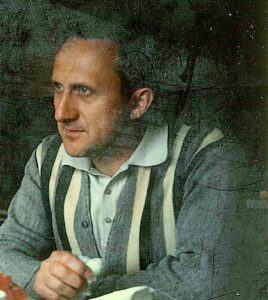(ALMOST) CONSTANT REJECTION
I wrote four novels in my 20s and 30s and had a topnotch agent. The agent handled Merle Miller, John Knowles, Garrison Keillor and me. I got rejected by high-quality publishing houses, like E.P. Dutton, Doubleday, Viking, Random House and Simon & Schuster. (How many of these publishing houses still exist?) I knew I’d get rejected a lot, but every three months for about 14 years? I developed the skin of a rhino.
My friend Harvey Pekar could kvetch. Then bingo, Dec. 31, 1979, The Village Voice ran a rave about Harvey’s comic books, and everybody suddenly liked Harvey’s stuff. Pekar walked to the post office almost daily to check his P.O. box for fan mail. He said, “Two or three of these [fan letters] a month keeps me going.”
Back to me . . . (Check out what I’ve written about Pekar here.) My final novel was about a Slovenian cop in Collinwood. I think Pekar would have appreciated. Not sure, because by then Pekar was married to his third wife, who didn’t let him hang around with his old friends. My novel had a weak plot. I wish I could do plots but I can’t. Whenever I hear “let me tell you a story,” I want to scram. Some rabbis like to tell stories. That’s their shtick: “Hey, here’s a parable.” Storytelling, that’s a buzzword. (Buzzword is a buzzword.)
A Viking editor wrote me: “You have a nice way with words, your dialogues are good, and your characters emerge as individuals.” That was probably my best rejection. My worst one was from my dad, who told me I was on “one big ego trip.” But my dad never abandoned me. He even wrote my literary agent to try to boost my stock. In 1973, when I was “on the road” in Latin America, my dad opened my mail in Cleveland and corresponded with my agent. He wrote her: “I have no quick way to contact Bert as he is traveling in Mexico.” My dad became my literary secretary.
Thirteen years later. 1986. My dad died fairly suddenly of leukemia and as soon as he was in the ground, I started searching for the letter he had written my agent. I looked through all my father’s paperwork, but his writings were mostly about toilets, radiators and insurance. He owned apartment buildings in Lakewood. He wrote, “Light incinerators from the top so they burn down . . . Thermocouples are our biggest problem. Kick in manually if necessary.”
I tried reaching the literary agent in New York; I wanted her to dig up the letter. But she was retired. A younger agent wrote back, “We were touched and wish we could produce your father’s letter but, alas, it is among the missing. The back files of the agency are at the Columbia University library. We thin our files from time and time, and I have to assume that your father’s letter fell victim to the thinning process.”
John Knowles visited my agent’s office twice a month to chat. My agent submitted A Separate Peace to 27 publishers before Macmillan picked it up in 1960. Why didn’t the agent get me 27 rejections-per-book? (Aside: My friend and op-ed writer Jimmy Sollisch says he’s going to write a piece about near misses. He says everybody has a good near-miss story. True.)

Toby Straton, 1967. Age 50
My dad urged me to get more involved in the family business, like point up some bricks, paint some walls, and get my hands dirty. He thought I should back off the typing and deal with real characters — plumbers, painters, bankers, insurance men.
I went into the real estate business, oh yeah. I stopped writing books and worked on a new long-term project — becoming worthy of the tombstone epitaph: “This guy didn’t screw up the family business.”
I found my dad’s correspondence with my agent a couple years ago. The letter was in the attic among some rejections. Here’s the letter . . .
“As Bert’s father, I’m sure you will understand my taking this opportunity, though I know Bert will shoot me the first chance he gets, to add that coupled with his talent he is a very dedicated, hard-working and disciplined writer. His heart, soul and efforts are all wrapped up in his work. And he started another book before he went off to Mexico to travel. On Bert’s behalf, I want to thank you for your encouraging letter, your interest in his book and everything you will do to try to get it published. Please do not hesitate to write me if I can be of further help during Bert’s absence. Thanks you so much and good luck.”
Is that an acceptance letter?
[This essay appeared, in slightly different form, in Belt Magazine in 2015. “My Acceptance Letter.”]

2 comments
I’ll consider that blog contribution your FIFTH book, at least.
For the heck of it, why not ask ChatGPT to brush up the plot on the cop novel? You may not like the tedious business of plotting, but for AI it’s a snap.
Leave a Comment